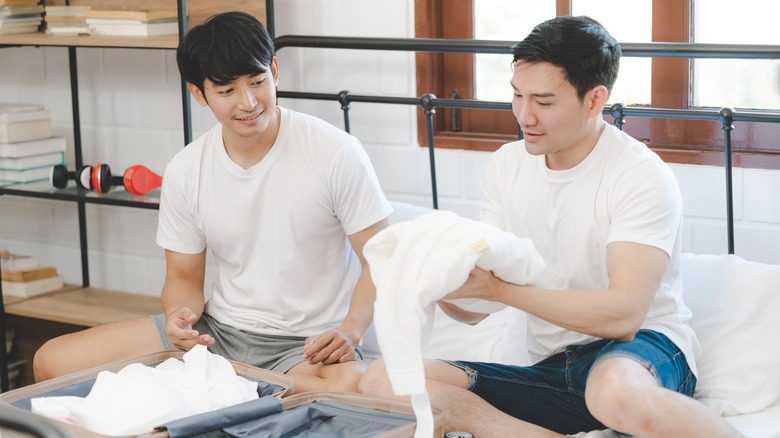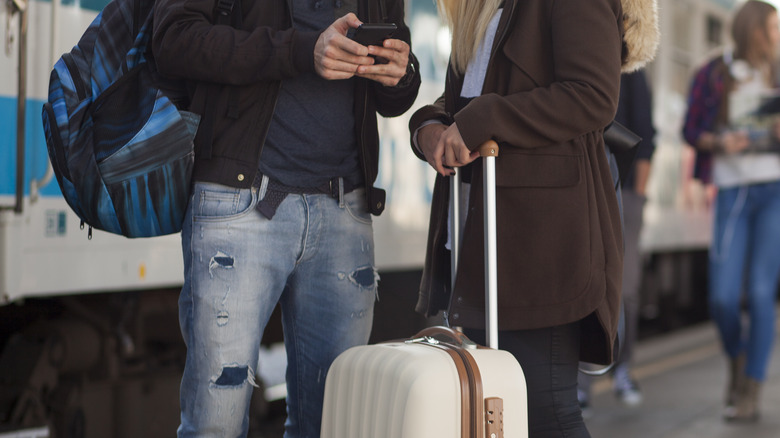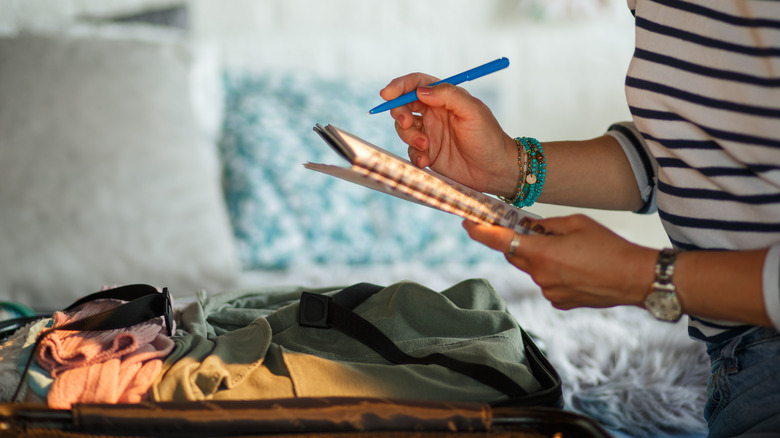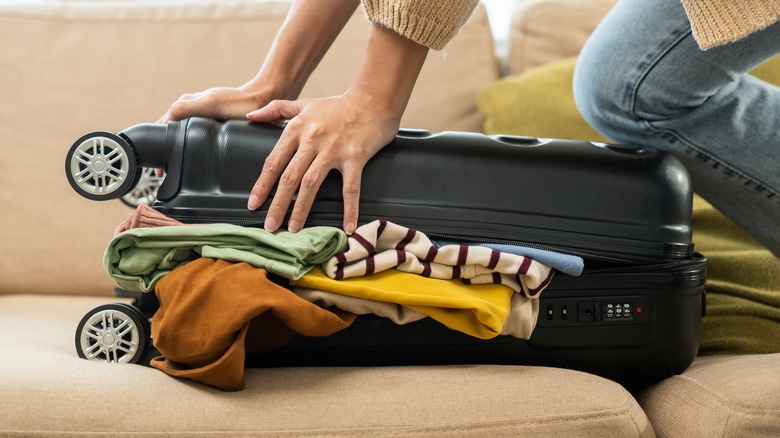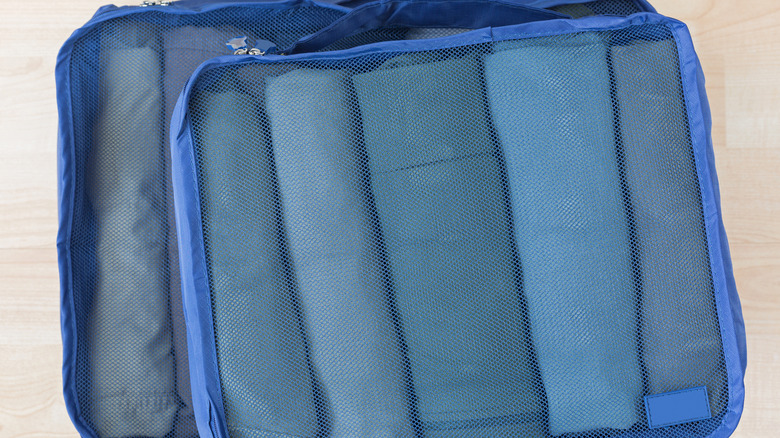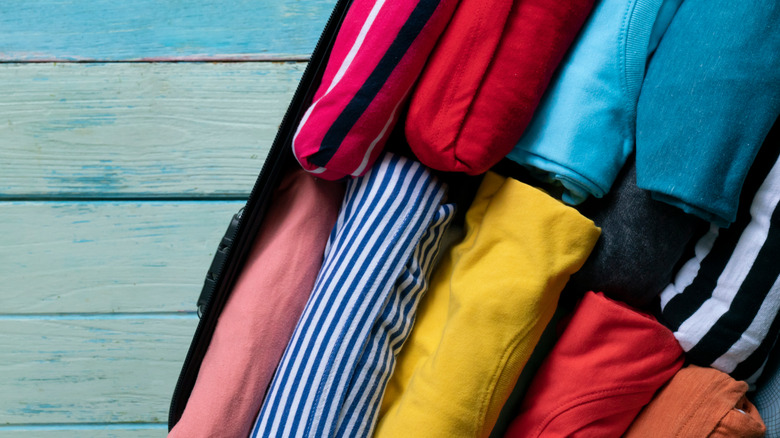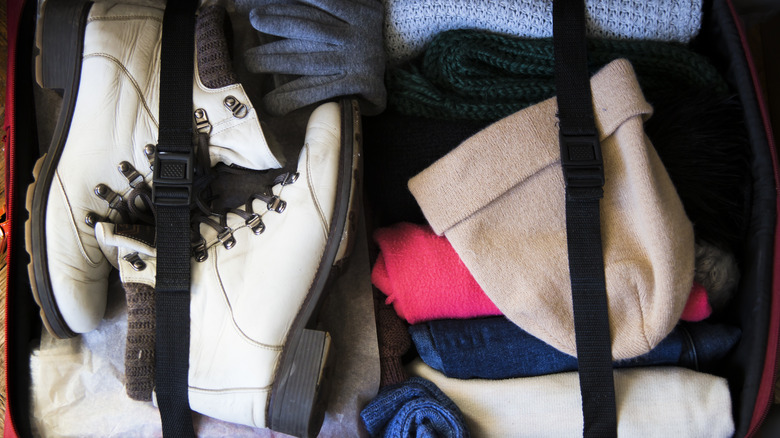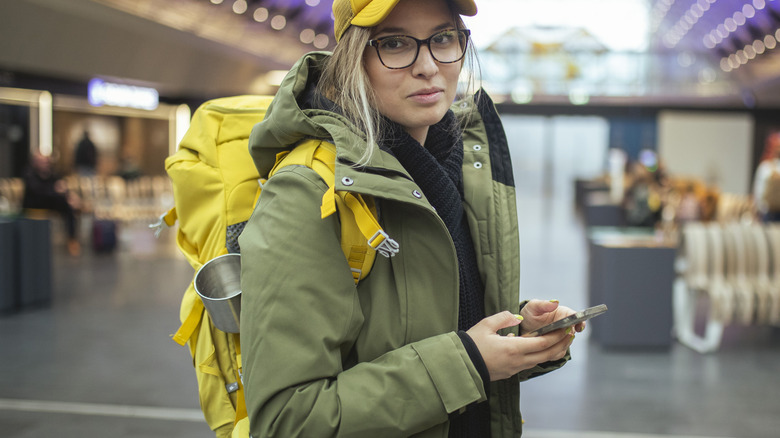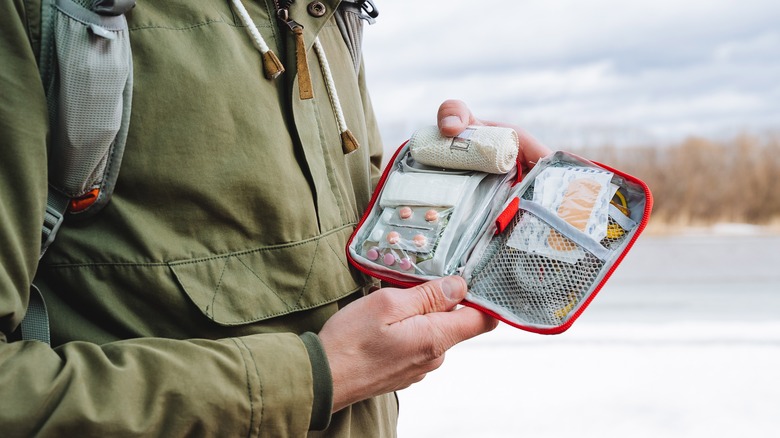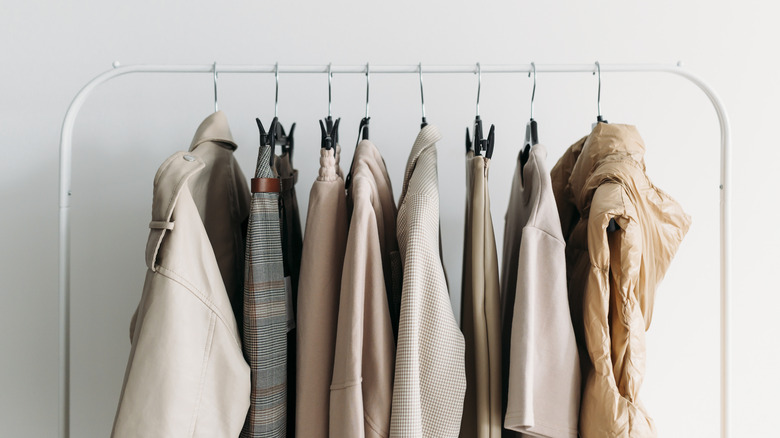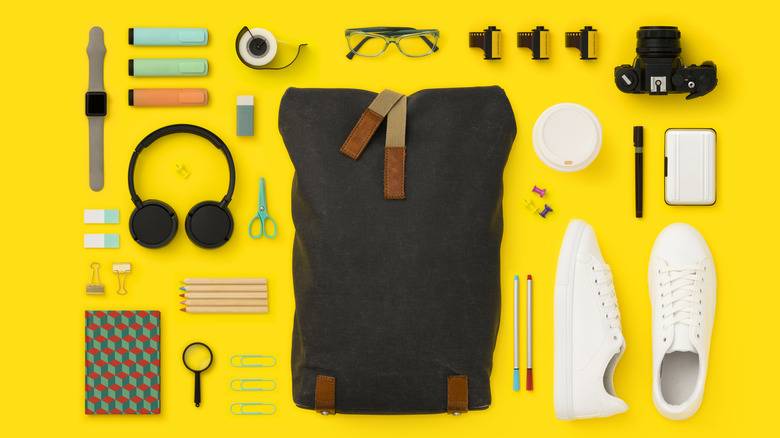Hacks For Couples When Packing Only One Piece Of Luggage
When it comes to travel icks, packing is a big one. Over 60% of travelers polled said that packing gave them anxiety. When there are two of you trying to pack for a vacation, it can become doubly difficult. Luckily, there are several ways for a couple to reasonably pack one big piece of luggage between them to avoid overpacking, lugging multiple bags, and stressing out about a relaxing vacation.
Some airlines allow you to check bags for free, especially if you're a loyalty member or credit card holder. If you are strictly a budget airline flier, though, you're unlikely to score free luggage. Doubling up into one checked or carry-on bag is one way to reduce the fees associated with luggage. Not to mention, it helps facilitate better packing habits for both travelers. Learning to pack less will free up so much of your brain for the joys of travel.
As someone who hates overpacking, sharing a bag or suitcase with a partner or travel buddy is a learned habit. It can be difficult at times, but these tips have come in handy a lot in this writer's experience traveling with someone else, particularly a spouse. Don't let any additional frustration lead you to give up on this packing move; sometimes, it just takes a bit of practice as well as more pre-planning than you may be used to.
Choose the right kind of suitcase
The length of your trip, the weather at the destination, and your type of itinerary will determine how much you have to pack. That, in turn, will determine what kind of suitcase you need to bring along. For example, if you're going on a big ski trip in the dead of winter, you'll want to pack a larger checked bag rather than try to cram all the gear in a carry-on. As for long weekends, sometimes a carry-on or duffel will be enough space for two.
One of the best ways to pack two people into a suitcase is to divide and conquer. Hardshell bags that are roughly the same on both sides are well-suited for sharing. The key to packing these kinds of bags is to ensure you aren't overpacking the front side, or it won't roll correctly.
Whereas trying to keep the packing for two people in a soft-sided suitcase can be an ordeal. Soft suitcases are nice for overpackers because there is more give; however, when you overpack them too much, their wheels don't maneuver well. They also tend to overstuff or not fit in the overhead bins as carry-on bags.
Keep things fair
Splitting the suitcase 50/50 sounds like an excellent way to pack. However, every person needs different things, which may not be a reasonable ask of a partner. It's better to have each of you write out a packing list, collaborate on it, and try to reduce it as much as possible. One partner may have larger clothes than the other or need additional toiletries, for example. In which case, splitting the bag exactly in half wouldn't be fair to that other person. Rarely will an exact split be truly equal between both travel parties.
Keeping things fair does not mean bringing extra stuff just because your partner needs to. Everyone will have their own notion of sharing this space, so it is important to have a frank conversation with your partner before packing. If you are drastically different vacation packers — a minimalist and a maximalist — it may not be possible to achieve a shared luggage space. That's ok! You want to figure that out before trying to pack your things together, which can cause undue stress for different travelers.
Pare down your wardrobe
This is a skill travelers have to work at, whether they share a suitcase or not. That skill is to save space in your shared luggage by only packing the clothing you absolutely need. Think about what can be worn more than once, like jeans, and pack by outfit rather than a bunch of "just in case" clothes. Having a travel capsule wardrobe, a bunch of neutral-toned clothes that can be mixed, will also make halving the suitcase easier.
Consider utilizing the 5, 4, 3, 2, 1 rule for packing. That entails packing no more than five sets of socks and underwear, four tops, three bottoms, two sets of shoes, and a hat. Adhering to a tried-and-true rule like this helps make it easier to say no to overpacking clothes.
Part of a minimalist pack can include planning to do laundry while you travel. You don't need to worry about finding a laundromat, either. Sink-washing your clothes at a hotel only takes a few minutes. Pack powdered travel detergent or, if you forget, a dollop of hair conditioner will also get the job done. Carefully placing your wet clothes on a balcony to air dry will help them dry faster. If there isn't a balcony or the weather isn't cooperative, try hanging your clothes in the bathroom with the fan or vent running. It sounds silly, but this writer can attest to the fact that it works.
Utilize packing cubes
Packing cubes not only help reduce the space clothes take up in a suitcase, but they can also keep your outfits separate. Packing by outfit rather than clothing item is one way to avoid overpacking. Outfits can be put into the cubes together as space allows, which helps keep the luggage organized. After all, vacations are supposed to be as stress-free as possible.
Each traveler can have their own designated packing cube(s) to keep their clothes together. Then, as you wear your clothing, you can also use the packing cube to store dirty items. Putting worn clothes back in the packing cubes also keeps any odor trapped, so your whole suitcase doesn't get stinky.
If equally sharing space is a point of contention between you and your suitcase buddy, packing cubes can also be a terrific equalizer. Even if your clothes aren't the same size or you or your partner needs more pieces, the cubes help keep things somewhat equal. Having a limited space to pack your clothes forces you to make more choices about what needs to be packed and what doesn't.
Roll, don't fold your clothes
Rolling clothing tightly into little log-shaped bundles is a space saver compared to just folding your clothes. No, it doesn't look as nice, but it will give you a lot more room in your suitcase to pack other things. You could even roll outfits together, starting with your largest item as the bottom layer and your smallest item as the top layer. Rolling also helps avoid wrinkles.
Rolling clothes is beneficial because it forces air out between the fabric layers. This reduces the space they take up by making the most use of the available space. Even when you aren't traveling, this is one of the best ways to keep clothes in drawers.
It should be noted that rolling isn't always the most effective packing method if you're using packing cubes. Depending on your clothing thickness, you may want to fold items into a cube instead. Otherwise, the cube becomes too bulbous and difficult to pack neatly into a suitcase.
Use every inch of space
A key to utilizing every inch of space in a suitcase is to see every item as another opportunity to pack better. By that, we mean using the insides of shoes to pack socks or the inside of a hat for bras. Not only does this mode help keep the other items, like the hat, in shape in the luggage, but it also makes use of the otherwise wasted space.
For folks who wear bras, these pieces of clothing are made for this kind of utilitarian packing. Not only do bras sit on top of one another, which saves space, but you can also place items like tank tops or socks in them.
You can also leave out the smallest items, like underwear or socks, until you're done packing. Once you've packed all the larger clothes or accessories, see where the gaps are. Those gaps can often fit one or several small items. That's often how this writer fills in all available space.
Share what you can
One of the perks of sharing luggage with a partner is that you don't need one of everything. You can share toothpaste, sunscreen, and lotions. Depending on your size ratio, you could also potentially share clothing, too. This writer can attest that being able to share clothes with a partner is sometimes a lifesaver when sharing a single suitcase.
Sharing can further save space if you're more strategic with what is being shared. For example, using the same toothpaste will save space in a toiletry bag. However, sharing tablet toothpaste, which you bite into, makes your luggage less heavy and takes up significantly less space. The same goes for things like bar soap or shampoo. These items are more environmentally friendly while also being excellent space-saving swaps.
You can also reduce packing clutter by sharing a daypack. A daypack can be packed empty and flat into a suitcase. They can then be shared between two people, with plenty of space for everything you'll need for a day of sightseeing adventures. This may not be a great tip for anyone traveling somewhere for significant outdoor activity.
Wear bulkier items
Larger items, like hiking boots or coats, can occupy a lot of room in a suitcase. It makes sense to wear those bulky items when possible instead of packing them. Especially if you're trying to pack a bag between two people, two coats can significantly decrease the amount of space the two of you can share. For longer flights, it may not make sense to wear big boots. In which case, you could try tying them or otherwise hanging them on your backpack or personal item. That way, they aren't inside the suitcase or making you uncomfortable for six hours.
Something like a coat or sweater can also make for an excellent makeshift pillow or blanket for the plane, too. If you aren't a fan of neck pillows, folding up a large piece of outerwear works in a pinch. You can also roll scarves or thin clothes into the zipper cover of a neck pillow to further save suitcase space while also making your pillow a bit more comfortable.
Depending on the space available on the plane, you can also hang up your coat. Usually, the hanging racks are reserved for first- or business-class passengers. However, they're frequently not totally full. So, if you ask a flight attendant nicely, they may hang your coat up for you. There may also be room in the on-board closet for your outerwear. It is always worth it to ask; just avoid asking when the crew is busy, like during beverage service.
Pack essentials in each of your personal items
Anytime you aren't sharing a checked suitcase, it's a good idea to split essentials like underwear between your and your partner's luggage. That way, if someone's checked bag gets lost, they aren't without everything they need for the trip. The same goes for sharing a suitcase, too. Suitcases only go missing about one percent of the time, but it's still a good idea to pack as if it happened every time you travel.
Pack the most essential items each of you will need (especially things like medication) in your personal bag, which will stay with you during the whole flight. Never pack medication in checked luggage unless absolutely necessary. Strategizing with your partner and a medicine organizer is also another way to save space. You can each use the same medication box without worrying about mixing up your prescriptions.
Packaging at least one outfit (with socks and underwear) in your personal items is a good idea. Should your checked bag go missing for whatever reason, you'll have a spare set of clothes to get you through at least one day. The hope in doing this is that within 24 hours, you'll be reunited with your lost luggage.
Don't wait until the last minute
Packing at the last minute is never a good idea. Procrastinating on the packing process is even worse when you're trying to coordinate between two people. The sooner you start thinking about how to pack together, the easier it will be. You don't want to have a fight the night before or the morning of a vacation.
Give yourself at least two days before travel to pack. That way, you can pack what you think you need, have time to think over what you might've forgotten, and re-assess your decisions. Some travelers (this writer included) like packing further ahead of time to get excited about traveling. When you don't procrastinate on packing, you will also lessen the worry of leaving something important behind.
Early packing also reduces the likelihood that you'll overpack. That's because you will have a better idea of what you need as well as what you can leave behind. When over 50% of travelers surveyed are forced to sit on their suitcase to get it to zip, you know that overpacking is a serious issue. Beyond that, when you're sharing a suitcase with someone else, that penchant for overpacking can be a troublesome precedent.
Keep outfits neutral
Bringing outfits in neutral tones or colors makes it easier to travel with a pared-down wardrobe. You can bring along equally neutral accessories to make the most outfits out of the smallest number of actual clothes. Coordinating outfit tones will also make those vacation photos with your partner pop. As mentioned above, this is how you build a capsule wardrobe.
Aside from the clothing itself, neutrality also carries over to your accessories. You don't need to pack a week's worth of separate jewelry or other accessories when you can pack just a few to mix and match throughout your vacation. Accessories can easily become pieces of luggage that lead to arguments when two travelers are sharing that packing space. So, if you can keep them simple, that's the best approach.
Apply the neutrality to your shoe selection, too. Plan on bringing just a pair or two (which includes the pair you wear on the plane) that can go with any of the outfits you're packing. Shoes for beach vacations are a lot easier to pack around than wintertime ones, yet any amount of space is luggage acreage you can't use for anything else.
Pack your personal item bags with a purpose
Anytime you're packing luggage as efficiently as possible, that includes your personal items for the plane. If you approach your personal item with the same tenacity as you do your larger suitcase, the more you can fit even in a compact backpack. Don't just toss your items in that personal bag; place them with purpose so the space is used wisely.
Depending on the size of your personal items, you should use a spare packing cube for those emergency outfits. That way, you can easily just grab them together with the cube and leave plenty of space for other things like snacks, a water bottle, tech, and anything else you deem essential.
When packing your personal bag, keep in mind that it may be the only piece of luggage that never leaves your side. Besides making space for more stuff, packing with purpose also ensures you can find things as needed. The last thing you want to do is dig everything out of your backpack because you're trying to find lip balm halfway through a twelve-hour flight.
